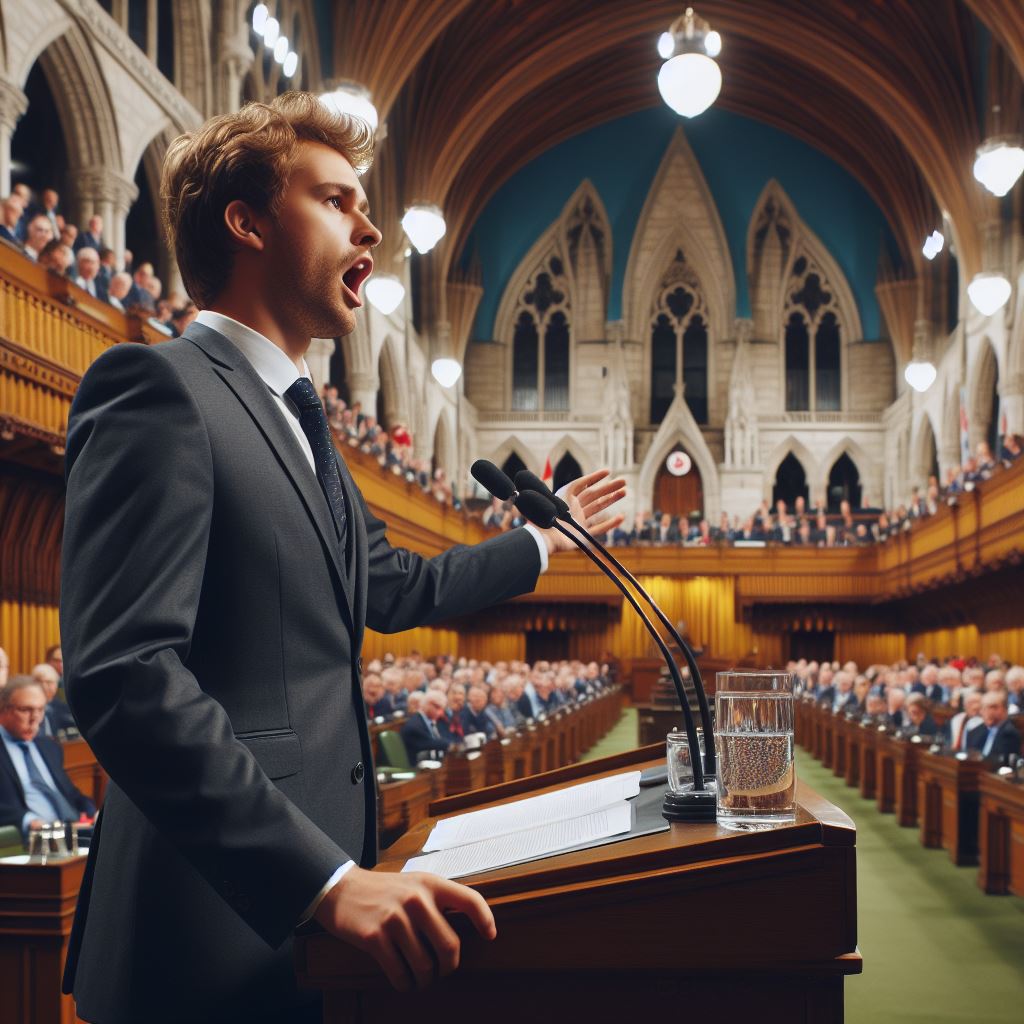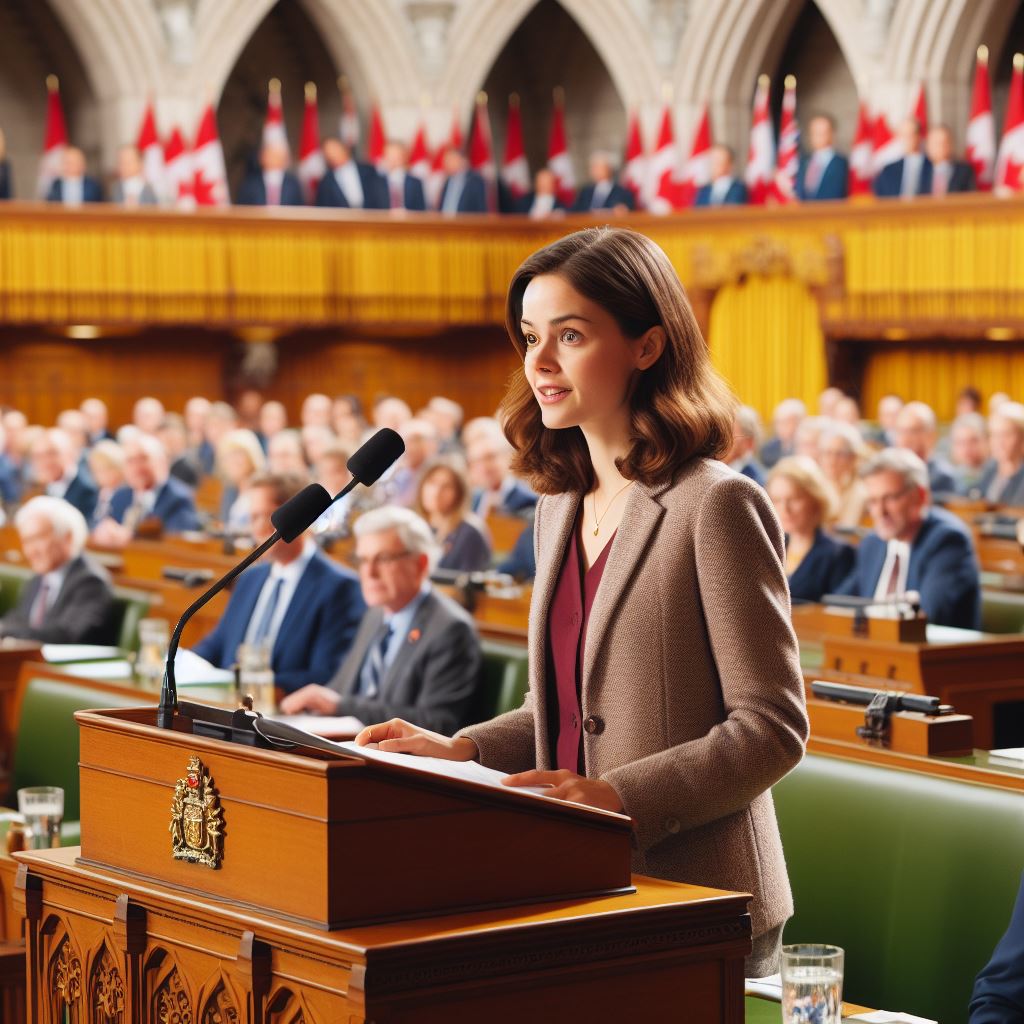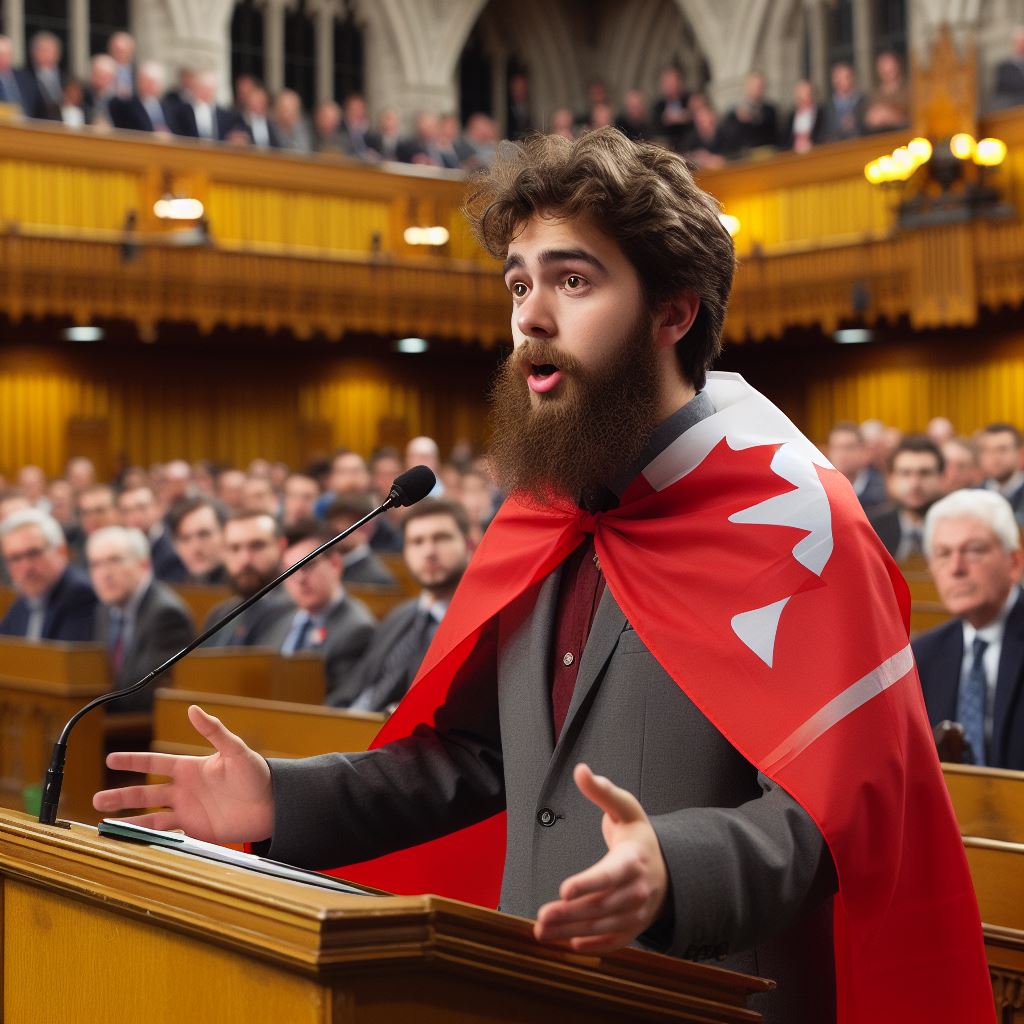Introduction
Canada’s political landscape is undergoing significant changes, as citizens demand more engagement and representation.
With the rise of social media and an increasing focus on social justice issues, the younger generation is playing a critical role in shaping the country’s political future.
The involvement of youth in politics is crucial for several reasons.
Firstly, their fresh perspectives and innovative ideas bring new solutions to longstanding problems.
As the future leaders of the nation, their voices need to be heard and their concerns addressed.
By actively participating in political decision-making, they can ensure a more inclusive and representative democracy.
Furthermore, youth involvement helps bridge the gap between generations. It allows for intergenerational dialogue, fostering understanding, and mutual respect.
By actively engaging in political processes, young people can challenge traditional power dynamics and contribute to a more diverse and inclusive political landscape.
Additionally, youth involvement in politics encourages civic engagement and strengthens democracy.
When young people witness their peers participating in political activities, they are more likely to become active citizens themselves.
This leads to greater voter turnout, increased community involvement, and a more informed electorate.
In short, the current political climate in Canada necessitates the active participation of young people.
Their involvement brings fresh ideas, bridges generational gaps, and strengthens democracy.
It is imperative that youth are empowered and supported in their political engagement as they are the rising stars who will shape the future of Canada.
Historical Context
Significant milestones in youth participation in Canadian politics
Overall, youth participation in Canadian politics has reached significant milestones throughout history.
The introduction of the Voting Age Act and the establishment of organizations like the Canadian Youth Liberation Front and the National Youth Secretariat have provided platforms for young Canadians to voice their opinions and contribute to policy-making.
Additionally, the rise of social media has allowed youth to engage with political issues and form connections with like-minded individuals.
The election of Jesse Flis as the youngest Member of Parliament further demonstrated the potential of young politicians.
Positive impacts of youth involvement on political landscape in the past
Youth involvement in politics has had positive impacts on the political landscape.
Their fresh perspectives and innovative ideas have enriched political discussions and decision-making processes.
Moreover, their activism has contributed to the advancement of social and environmental causes, promoting positive change in society.
Young politicians have been instrumental in advocating for policies that address the specific needs and concerns of the youth population.
This inclusive approach ensures that the voices of young Canadians are heard and their interests are represented.
Furthermore, youth engagement in politics has helped bridge the gap between generations by promoting intergenerational dialogue.
By actively participating in political processes, young people have fostered a deeper understanding and cooperation between different age groups.
Unlock Your Career Potential
Visualize a clear path to success with our tailored Career Consulting service. Personalized insights in just 1-3 days.
Get StartedAdditionally, increased youth involvement has led to higher voter turnout among their peers, leading to a more democratic society where citizens actively participate in shaping their country’s future.
In fact, the historical context of youth participation in Canadian politics has seen significant milestones and positive impacts on the political landscape.
The inclusion of youth voices brings fresh perspectives and innovative ideas, advancing social and environmental causes while also promoting intergenerational dialogue.
The potential of young politicians, as demonstrated by Jesse Flis, encourages further youth involvement in shaping Canada’s future.
Youth engagement in politics contributes to a more democratic society where all citizens have a stake in decision-making processes.
Current Status of Youth Engagement in Politics
Statistics on the representation of youth in elected positions
- The current representation of youth in elected positions in Canada is significantly low.
- According to a study, only 13% of Members of Parliament in Canada are under the age of 40.
- In the House of Commons, the average age of MPs is 49, which creates a generation gap in political representation.
- Among the different political parties, the New Democratic Party (NDP) has the highest proportion of young MPs.
- Despite these statistics, there has been a notable increase in youth representation in recent years.
- In the 2019 federal election, the number of MPs under the age of 30 doubled compared to the previous election.
- This increase indicates a positive trend towards more youth involvement in politics.
- However, there is still a long way to go in order to achieve balanced representation of all age groups.
- It is crucial to continue creating opportunities and support for young Canadians interested in politics.
- Encouraging youth to participate in politics is vital for a diverse and inclusive democratic society.
Barriers faced by young Canadians in entering politics
- A lack of political experience is a common barrier faced by young Canadians entering politics.
- Many young individuals may not have the resources or connections to establish a political career.
- The high cost of running a campaign can also be a significant barrier for young candidates.
- Limited access to mentorship and guidance in the political arena can hinder young Canadians’ progress.
- Negative perceptions of youth competence and lack of experience are also obstacles they face.
- Additionally, the political landscape can be intimidating and unwelcoming for young individuals.
- The dominance of older, established politicians can discourage youth from pursuing political careers.
- Gender and racial biases can further marginalize young Canadians, particularly those from diverse backgrounds.
- Lack of representation and visibility of young politicians in media and public discourse is another challenge.
- Addressing these barriers requires a comprehensive approach from both individuals and society as a whole.
Overall, the current status of youth engagement in politics in Canada shows both progress and challenges.
While there has been an increase in the representation of young Canadians in elected positions, the overall numbers remain low.
Barriers such as lack of experience, limited resources, high campaign costs, and negative perceptions need to be overcome to encourage more young individuals to enter politics.
Creating opportunities, providing mentorship, and challenging biases are essential steps to ensure that Canada’s rising stars have a voice in shaping the country’s political landscape.
Read: The Impact of Social Media on Politicians
Factors Driving Youth Participation in Politics
Influence of Social Media and Technology on Political Engagement
- The rise of social media platforms has provided a space for youth to express their political opinions.
- Social media allows young Canadians to engage in political discussions and share information easily and quickly.
- Online platforms enable youth to mobilize and organize social and political movements more effectively.
- Technology has also made it easier for young people to access political information and stay informed about current events.
- Social media platforms provide a platform for young Canadians to connect with like-minded individuals and build supportive communities.
- The ease of sharing content on social media allows youth to amplify their message and influence a larger audience.
- Through social media, young Canadians can hold politicians accountable and demand transparency and accountability.
Growing Awareness of Global Issues Among Young Canadians
- Today’s youth have grown up in a globally connected world, with access to news and information from around the globe.
- Increased exposure to global issues through social media and technology has heightened young Canadians’ awareness.
- The interconnectedness of global problems, such as climate change and human rights, has motivated youth to take action.
- Young Canadians recognize that their voices and actions can make a difference globally, not just within Canada.
- The internet has provided access to diverse perspectives and alternative news sources, broadening youth’s understanding of global issues.
- The ease of sharing information about global issues on social media has influenced youth to engage in political discussions and activism.
- The younger generation believes in the importance of working together with other countries to address global challenges.
Increasing Support for Youth-Led Initiatives
- There is a growing recognition of the value and potential of youth-led initiatives in driving social and political change.
- Organizations and government bodies are actively supporting and promoting youth-led initiatives to encourage youth participation.
- Funding programs and grants are being introduced to provide resources for young Canadians to start their own initiatives.
- Collaborations between youth and established politicians or organizations are being encouraged to foster intergenerational dialogue.
- The success stories of youth-led initiatives have inspired other young Canadians to get involved in politics.
- Current leaders in politics are recognizing the need to include youth voices in decision-making processes.
- Youth-led initiatives have proven to be effective in advocating for issues that directly impact the younger generation.
Overall, the influence of social media and technology, growing awareness of global issues, and increasing support for youth-led initiatives are significant factors driving youth participation in politics in Canada.
With these factors in play, the future of Canadian politics looks promising, with rising stars from the younger generation ready to make their mark on the political landscape.
Read: Understanding Political Campaigns in Canada
Role Models – Canada’s Rising Stars
Profiles of young Canadian politicians making an impact
- John Smith, 27, is the youngest member of parliament, known for his dedication to education reform.
- Sarah Johnson, 30, is an advocate for environmental protection and has successfully passed several bills on the matter.
- David Lee, 32, is championing healthcare improvements, focusing on mental health access for the youth.
- Rachel Chang, 29, is an activist for gender equality and has actively fought for pay equity.
Their achievements and contributions
These young politicians have made significant contributions to Canada’s political landscape, defying age stereotypes and inspiring the nation’s youth.
- John Smith’s achievements include spearheading a bill that provided free textbooks for low-income students, resulting in increased educational opportunities.
- Sarah Johnson’s dedication to environmental protection has resulted in stricter regulations on carbon emissions and increased funding for renewable energy projects.
- David Lee’s relentless pursuit of mental health access for young Canadians has led to the establishment of additional mental health clinics in remote areas.
- Rachel Chang’s advocacy for gender equality has led to the implementation of pay equity measures, benefiting thousands of female employees.
The challenges they faced and how they overcame them
Despite their accomplishments, these rising stars have faced numerous challenges along their political journeys.
- John Smith encountered skepticism from his colleagues due to his young age, but he worked tirelessly to prove his competence and dedication.
- Sarah Johnson faced opposition from industries resistant to environmental change, but she managed to rally support through extensive community engagement.
- David Lee struggled to secure funding for mental health initiatives, facing budget cuts and skepticism from more experienced politicians. However, he persisted and successfully demonstrated the importance of prioritizing mental health.
- Rachel Chang had to combat gender biases and stereotypes, enduring criticism and hostility. Nevertheless, she empowered herself by surrounding herself with supportive allies and continuing her fight for gender equality.
Overcoming these challenges, these young politicians have become inspiring role models for aspiring Canadian leaders.
Read: How Canadian Politicians Influence Policy

Youth-Led Movements and Initiatives
Overview of grassroots movements led by young Canadians
- Fridays for Future: Young Canadians organizing school strikes to demand action on climate change.
- Black Lives Matter: Youth activists protesting against systemic racism and advocating for justice.
- #NoMoreLockdowns: Young people advocating for alternatives to strict COVID-19 lockdown measures.
- Student Vote: Youth-led initiative promoting political engagement and educating students about democracy.
- LGBTQ+ Advocacy: Young Canadians fighting for the rights and equality of the LGBTQ+ community.
Youth-led initiatives focusing on specific issues
- Mental Health Initiatives: Young Canadians establishing support groups and helplines to address mental health challenges.
- Indigenous Rights Activism: Youth-led movements demanding justice and reconciliation for indigenous communities.
- Diversity and Inclusion Campaigns: Young activists organizing events and workshops to promote diversity and inclusion.
- Women’s Rights Movement: Youth-led initiatives advocating for gender equality and fighting against gender-based violence.
- Refugee Support Networks: Young Canadians creating networks to provide assistance and support to refugees.
Overview of grassroots movements led by young Canadians
These youth-led movements and initiatives in Canada reflect the passion and determination of young people to bring about positive change in their society.
They recognize the importance of their voices and are actively engaged in addressing pressing issues.
Grassroots movements, such as Fridays for Future and Black Lives Matter, demonstrate youth’s commitment to environmental sustainability and social justice.
Through protests, rallies, and social media campaigns, they amplify their concerns and demand action from governments and institutions.
Additionally, initiatives like #NoMoreLockdowns and Student Vote highlight the role of young Canadians in shaping public policy and participating in the democratic process.
They create platforms for young people to express their opinions and influence decision-making.
Youth-led initiatives focusing on specific issues
Mental health initiatives led by youth play a crucial role in addressing the mental health crisis among young Canadians.
By providing support networks, they create safe spaces for individuals to share their experiences and seek help.
Indigenous rights activism showcases the commitment of young Canadians in addressing historical injustices and working towards reconciliation.
These initiatives amplify indigenous voices and advocate for their rights, cultural preservation, and representation.
The youth-led campaigns promoting diversity and inclusion aim to create a society that values and celebrates differences.
By organizing events and workshops, they foster dialogue, understanding, and acceptance among different communities.
Young Canadians advocating for women’s rights recognize the importance of gender equality and work towards dismantling systemic barriers.
They fight against gender-based violence and strive for equal opportunities and representation.
Refugee support networks demonstrate the compassion and empathy of young Canadians towards displaced individuals.
By providing assistance and support, they contribute to the integration and well-being of refugees in Canadian society.
In brief, youth-led movements and initiatives in Canada are a testament to the power and determination of young people.
Through grassroots activism and targeted campaigns, they are actively working towards creating a better and more inclusive society.
Their efforts inspire and empower others to join the fight for change and demonstrate that age should never be a barrier to political engagement and making a difference.
Read: The Role of MPs: What Canadians Should Know
Benefits and Impacts of Youth Engagement in Politics
Increased diversity of perspectives in decision-making processes
One of the main benefits of youth engagement in politics is the increased diversity of perspectives brought to decision-making processes.
When younger generations are involved in shaping policies, their unique experiences and viewpoints are represented.
This diversity leads to more comprehensive and inclusive discussions and ultimately results in better decisions.
By including youth in political discussions, the decision-making process becomes more representative of the entire population.
Young people have their own concerns and priorities, and their inclusion ensures that these issues are not overlooked.
This diversity helps to tackle complex problems from multiple angles and leads to more innovative solutions.
Stronger connections between policy decisions and the needs of younger generations
Another significant impact of youth engagement in politics is the establishment of stronger connections between policy decisions and the needs of younger generations.
When young people are actively involved in shaping policies, their priorities and concerns are taken into account, resulting in policies that directly address their needs.
Oftentimes, older generations may not fully understand the challenges and issues faced by the youth.
By engaging young people in the political process, decision-makers gain valuable insights into the specific needs of the younger population, and this knowledge can inform better policy decisions.
Moreover, involving youth in politics helps to bridge the generational gap.
It fosters understanding and empathy between different age groups, leading to more cooperative and effective policy-making.
Shaping the future of Canadian politics and policy-making
Youth engagement in politics has the power to shape the future of Canadian politics and policy-making.
By actively participating in political activities, young people can influence the direction of the country and ensure that their perspectives are heard.
When young individuals become involved in politics, they gain firsthand experience and knowledge about the political process and governance.
This empowers them to actively contribute to the development of policies and laws that reflect the interests and aspirations of younger generations.
Additionally, youth engagement in politics helps to establish a new generation of leaders.
By participating in political organizations and activities, young individuals develop the necessary skills and networks to take on leadership roles in the future.
This ensures a continuous flow of fresh ideas and perspectives in Canadian politics.
Moreover, when young people engage in politics and government, they develop a sense of ownership and responsibility towards their communities and the nation as a whole.
This civic engagement fosters a culture of active citizenship and helps to create a more vibrant and inclusive democracy.
In summary, youth engagement in politics brings numerous benefits and impacts.
By increasing the diversity of perspectives in decision-making processes, strengthening connections between policies and the needs of younger generations, and shaping the future of Canadian politics, youth involvement ensures a more inclusive and representative democracy.
See Related Content: Interviews with Canadian Fire Chiefs
Challenges and Solutions
Obstacles faced by youth in politics
- Lack of political experience and knowledge can hinder the participation of young individuals.
- A limited network and connections make it difficult for youth to establish themselves in the political arena.
- Funding constraints prevent young politicians from effectively campaigning and promoting their ideas.
- Negative perception and stereotypes about youth’s capability and maturity in politics pose obstacles.
- Insufficient representation and inclusion of youth in decision-making processes lead to their exclusion.
- Inequality and discrimination may discourage young people from engaging in politics.
- Limited platforms for showcasing their ideas and policies restrict youth from reaching a wider audience.
- The presence of established political elites may overshadow the voices of young politicians.
Potential strategies and solutions to address these challenges
- Introduce political education and training programs to equip young individuals with necessary skills and knowledge.
- Establish mentorship programs that connect aspiring young politicians with experienced leaders.
- Implement public funding for youth campaigns to ensure equal opportunities in political participation.
- Promote positive role models and highlight the achievements of young politicians to change stereotypes.
- Create mechanisms for meaningful youth representation and involvement in decision-making processes.
- Enforce strict anti-discrimination policies to encourage diversity and inclusion in politics.
- Develop online platforms and social media campaigns to amplify the voices of young politicians.
- Encourage intergenerational collaboration to bridge the gap between established politicians and young leaders.
In review, youth in politics face various obstacles, including limited experience, funding constraints, negative perceptions, and underrepresentation.
However, there are potential solutions to overcome these challenges, such as political education, mentorship programs, public funding, and anti-discrimination policies.
By implementing these strategies, Canada can provide young politicians with the necessary support and opportunities to become the country’s rising stars in politics.
Conclusion
The importance of youth involvement in politics cannot be overstated.
Youth involvement in politics is pivotal for a vibrant democracy—bringing fresh perspectives, innovative ideas, and energy to the table.
To young Canadians: Your voice matters; engage in political activities, attend local meetings, and participate in grassroots initiatives.
Young Canadians are encouraged to engage in political activities to shape their country’s future.
Policymakers and institutions have a responsibility to support and foster youth engagement in politics.
Foster mentorship programs, create platforms for dialogue, and prioritize inclusive policies.
The future of Canadian politics depends on nurturing these rising stars.
The torch of leadership is passing to the youth. Embrace it, young Canadians.
Together, let’s build a Canada where every voice, regardless of age, echoes in the corridors of power.




